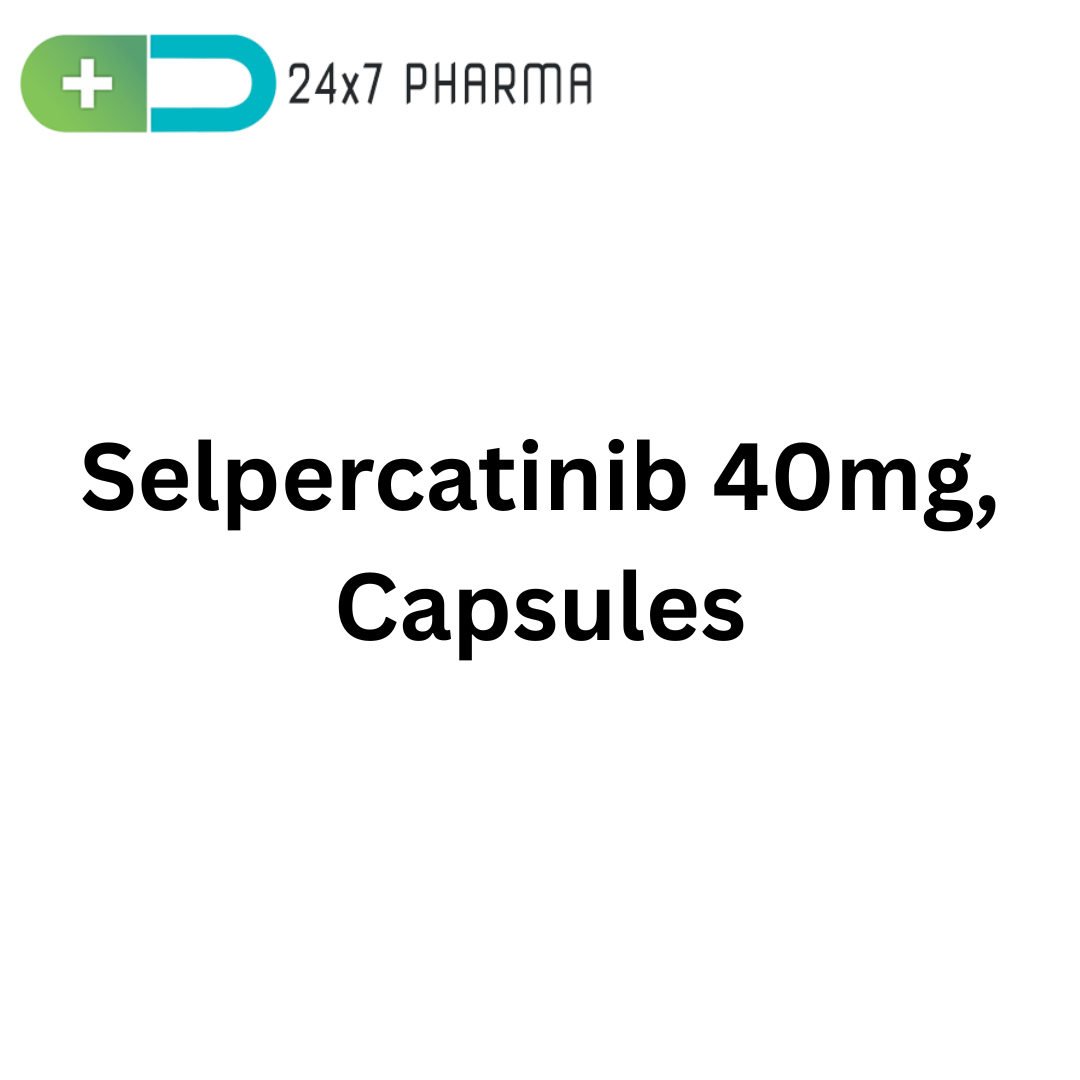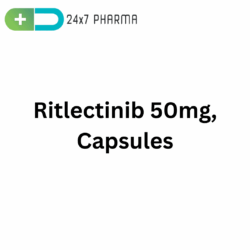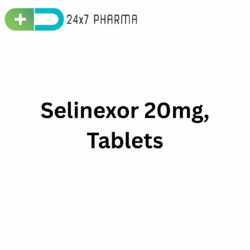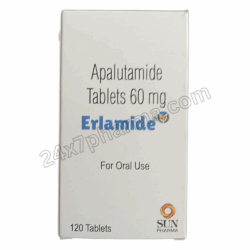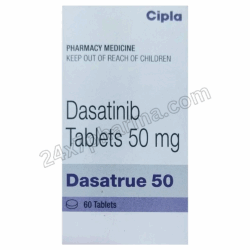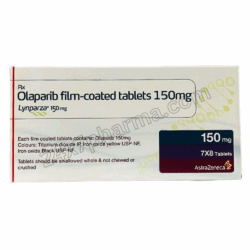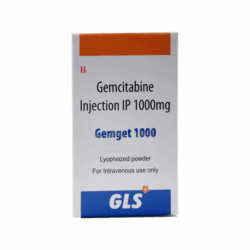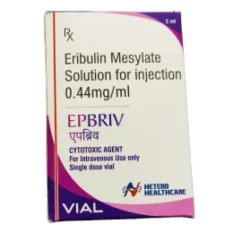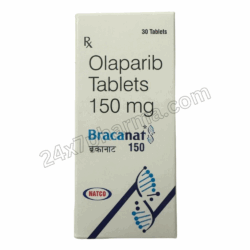Lucisel 40mg, Selpercatinib Capsules
LuciSel 40mg contains Selpercatinib, a targeted cancer therapy developed to treat certain types of cancers driven by RET (Rearranged during Transfection) gene alterations. Patients with RET-altered non-small cell lung cancer (NSCLC), thyroid malignancies, and medullary thyroid carcinoma (MTC) can use this selective RET kinase inhibitor. LuciSel represents a significant advancement in precision oncology, offering improved outcomes with a better safety profile.
What is LuciSel 40mg (Selpercatinib)?
The oral anti-cancer drug LuciSel 40mg contains the selective RET inhibitor Selpercatinib. Tumor growth in several cancers is known to be fueled by RET gene mutations and fusions. Selpercatinib is specifically designed to inhibit these RET alterations, thus controlling the growth and spread of RET-driven tumors.
It is indicated for patients who test positive for RET gene fusions or mutations and have limited or no alternative treatment options.
How it Works / Mechanism of Action
Selpercatinib works by selectively inhibiting the RET tyrosine kinase receptor, a protein involved in cell proliferation and survival. RET gene alterations can lead to abnormal signaling pathways that cause cells to grow uncontrollably. These include:
- Fusions of the RET gene in papillary thyroid tumors and NSCLC
- RET gene mutations in medullary thyroid cancers
- By binding to the RET receptor, Selpercatinib blocks this abnormal signal, thereby reducing tumor growth, metastasis, and enhancing apoptosis (programmed cell death).
- It is also designed to penetrate the central nervous system (CNS), helping control brain metastases often seen in advanced lung cancers.
How to Use / Indications
LuciSel 40mg is indicated for:
- Adults with RET fusion-positive non-small cell lung cancer (NSCLC).
- Thyroid Cancer (including Papillary Thyroid Cancer): Adults and children (≥12 years) with RET fusion-positive thyroid cancer that is refractory to radioactive iodine treatment.
- Systemic treatment is required for adults and children 12 years of age and older with RET-mutant medullary thyroid carcinoma (MTC).
- Before starting treatment, genetic testing is required for all patients to confirm RET mutations.
How to Take / Dosage
Recommended Dosage for Adults and Adolescents (≥12 years):
Body weight determines the dosage of sepercatinib:
- ≥50 kg: 160 mg orally twice daily
- <50 kg: 120 mg orally twice daily
Since LuciSel is available in 40mg strength, doses are usually adjusted by combining multiple capsules.
Administration Tips:
- Take on an empty stomach, at least 2 hours after food and 1 hour before the next meal.
- Swallow capsules whole with water. Do not crush, chew, or open.
- If a dose is missed, take it as soon as possible unless the next dose is due within 6 hours.
Other Dosage Forms / Strengths
Selpercatinib is available in various strengths to facilitate precise dosing:
- 40 mg capsule (LuciSel 40mg)
- 80 mg capsule (used for higher-dose requirements)
- Your healthcare provider may adjust the dose based on tolerability, organ function (especially liver), and side effects.
Side Effects
Like all medications, LuciSel can cause side effects. These are categorized into common, less common, and serious adverse events.
Common Side Effects:
- Diarrhea or constipation
- Fatigue
- Dry mouth
- Hypertension
- Edema (swelling in hands/feet)
- Nausea and vomiting
- Headache
- Abdominal pain
Serious Side Effects:
- Liver enzyme elevation (ALT/AST)
- QT interval prolongation (heart rhythm issue)
- Bleeding events
- Hypersensitivity reactions
- Pneumonitis (lung inflammation)
- Regular blood tests and ECGs are required during therapy to monitor safety.
Storage
- Store at room temperature (20°C–25°C).
- Keep the capsules in their original container with the lid tightly closed.
- Protect from moisture and direct sunlight.
- Keep out of reach of children and pets.
Benefits of LuciSel (Selpercatinib)
- Targeted Action: Selective inhibition of RET with minimal off-target activity.
- High Response Rates: Clinically proven to shrink tumors in both lung and thyroid cancers.
- CNS Activity: Effective in treating brain metastases due to its ability to cross the blood-brain barrier.
- Well-Tolerated: Lower toxicity compared to traditional chemotherapy.
- Improved Quality of Life: Allows oral outpatient treatment with fewer hospital visits.
Prescription Requirement
LuciSel is a prescription-only medication, and must be prescribed by an oncologist or qualified specialist. Genetic testing to detect RET gene fusions or mutations is mandatory before starting therapy.
Drug Interactions
Selpercatinib is metabolized primarily by CYP3A4. The following interactions should be considered:
Avoid with:
- Strong CYP3A inhibitors (e.g., ketoconazole, itraconazole) – may increase toxicity.
- Strong CYP3A inducers (e.g., rifampin, carbamazepine) – may reduce effectiveness.
- Drugs that prolong QT interval – increase the risk of heart rhythm disturbances.
Monitor closely with:
- Antihypertensive drugs (due to risk of elevated blood pressure)
- Anticoagulants or antiplatelets (increased bleeding risk)
- Always inform your doctor of all medications, including over-the-counter drugs and supplements.
FAQs
Is LuciSel a chemotherapy drug?
No, it is a targeted therapy, not traditional chemotherapy.
How long is LuciSel take?
Until disease progression or intolerable side effects occur.
Is genetic testing necessary before using LuciSel?
Yes, RET alteration must be confirme before treatment.
Does it help with brain metastases?
Yes, it is effective in the central nervous system as well.
Conclusion
LuciSel 40mg (Selpercatinib) is a breakthrough in cancer therapy, offering targeted treatment for patients with RET-driven cancers. Its ability to specifically inhibit RET kinase, favorable safety profile, and oral administration make it a preferred option over conventional treatments. As with all advanced targeted therapies, it must be administered under the guidance of a specialist after confirming the genetic status. With regular monitoring and adherence to dosage guidelines, LuciSel can significantly enhance both survival and quality of life in eligible patients.

